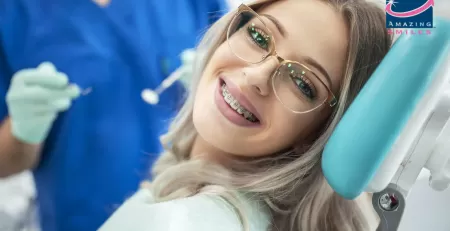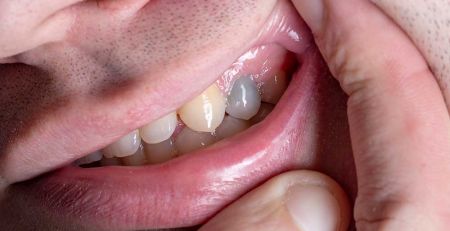Table of Contents
Transforming Smiles and Your Face Shape: The Remarkable Impact of Dental Braces on Facial Profile
Dental braces, widely recognized for their ability to straighten teeth, also possess the remarkable ability to subtly transform one’s face shape, contributing to an overall improvement in facial profile. This transformation mainly depends on the specific orthodontic issues being addressed, the type of braces used, and the individual’s facial structure.
The impact of braces on facial shape can be profound, particularly when used to correct significant bite or alignment issues.
The Basics of How Braces Work
Braces apply continuous pressure to the teeth over a period of time, gradually moving them into the desired position. This movement can affect the jawline and the structure of the face, particularly in cases where the correction involves significant adjustments to the bite or alignment.
Facial Profile Transformations with Dental Braces Correcting Overbite or Underbite

An overbite or underbite can significantly alter the balance and appearance of the face.
Dental Braces that correct these issues can lead to a more proportionate facial structure.
For example, correcting an Overbite often makes the upper lip appear more relaxed and less protruding.
In cases of an underbite, treatment can balance the chin and lower jaw, softening the facial profile.
Impact on the Jawline
Orthodontic treatment can significantly impact the jawline’s appearance, particularly in treatments involving the realignment of the jaw.
Braces can help achieve a more symmetrical and aesthetically pleasing jawline for individuals with a misaligned jaw. This can result in a stronger, more defined jawline that enhances facial harmony.
Ideal outcomes from orthodontic treatment should balance enhancing the aesthetic appeal of the teeth, smile, face, and jawline and establishing a stable, comfortable, and fully functional bite.
Changes in Cheekbones and Face Shape
While braces primarily affect the teeth and jaw, correcting dental issues can indirectly influence the appearance of the cheekbones and overall facial symmetry.
For instance, correcting crossbites or expanding the palate can lead to slightly widening the upper jaw, which may enhance the cheekbones’ prominence.
Straighter teeth and a corrected bite can improve facial symmetry, contributing to a more balanced appearance.
Orthodontics Effects on Facial Profile

The profile of one’s face can also undergo changes with orthodontic treatment.
For example, correcting an overbite can reduce the appearance of a “sunken” face by bringing the teeth into proper alignment, which supports the lips and cheeks more effectively.
Conversely, treating an underbite can reduce the prominence of the lower jaw in the profile, creating a more harmonious balance between facial features.
The Role of the Periodontal Ligament in Face Shape Transformation Through Braces
The transformative effect braces have on facial structure stems from the way the face reacts to the braces’ mechanics.
Braces exert pressure on the periodontal ligament, the connective tissue that secures your teeth to their surrounding bones. This braces system, comprising various components, gently nudges your teeth by applying consistent pressure.
As a result, pressure triggers your body to produce cells that either build up or break down the bone, aligning the teeth according to the braces’ direction.
As these cellular activities remodel the bones, the contours of your face gradually evolve.
An orthodontist or general dentist meticulously adjusts the pressure exerted by the braces to address dental issues and ensure that any alterations to your facial structure are advantageous.
Adjustments might involve adding or removing bands or updating the braces’ wires to fine-tune the pressure on the periodontal ligaments. This sustained pressure not only influences the positioning of your jaw but also alters the symmetry of your face.
These potential facial changes are a crucial aspect of your treatment planning, enabling orthodontists to anticipate the impact of braces on both your smile and facial aesthetics.
Age-Related Considerations For Dental Braces & Facial Profile
It’s important to note that the extent to which braces can change the shape of one’s face may be influenced by the patient’s age.
Children and teenagers, whose bones are still growing, may see more pronounced changes than adults.
However, even in adults, braces can significantly improve dental health and facial aesthetics.
Contact Amazing Smiles Dentistry For Orthodontic and Cosmetic Dental Advice

Braces do more than straighten teeth; they can subtly alter the shape of the face to create a more balanced, symmetrical appearance.
The specific changes depend on the individual’s unique dental issues and the type of orthodontic treatment.
While the primary goal of braces is to improve oral health and function, the aesthetic benefits cannot be overlooked.
A well-aligned bite and straight teeth can contribute to a more attractive facial structure, boosting confidence and improving overall quality of life.
As with any medical treatment, prospective patients should consult with an experienced orthodontist to discuss their goals and expectations regarding the potential changes braces may bring to their facial appearance.









